Related Research Articles
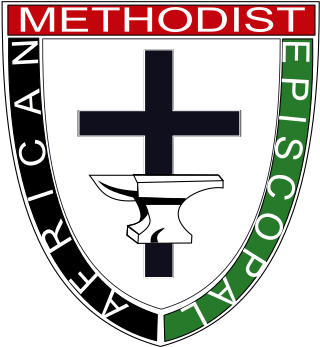
The African Methodist Episcopal Church, usually called the AME Church or AME, is a Methodist Black church. It adheres to Wesleyan-Arminian theology and has a connexional polity. The first independent Protestant denomination to be founded by Black people, AME welcomes and has members of all ethnicities.

The National Baptist Convention of America International, Inc., more commonly known as the National Baptist Convention of America or sometimes the Boyd Convention, is a Christian denomination based in the United States. It is a predominantly African American Baptist denomination, and is headquartered in Louisville, Kentucky. The National Baptist Convention of America has members in the United States, Canada, the Caribbean, and Africa. The current president of the National Baptist Convention of America is Dr. Samuel C. Tolbert Jr. of Lake Charles, Louisiana.

The African Methodist Episcopal Zion Church, or the AME Zion Church (AMEZ) is a historically African-American Christian denomination based in the United States. It was officially formed in 1821 in New York City, but operated for a number of years before then. The African Methodist Episcopal Zion Church adheres to Wesleyan-Arminian theology.
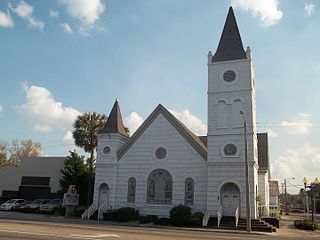
The black church is the faith and body of Christian denominations and congregations in the United States that predominantly minister to, and are also led by African Americans, as well as these churches' collective traditions and members. The term "black church" may also refer to individual congregations, including in traditionally white-led denominations.
Simmons College of Kentucky is a private, historically black college in Louisville, Kentucky. Founded in 1879, it is the nation's 107th HBCU and is accredited by the Association for Biblical Higher Education.
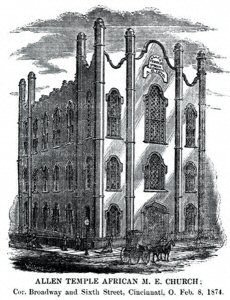
The Allen Temple AME Church in Cincinnati, Ohio, US, is the mother church of the Third Episcopal District of the African Methodist Episcopal Church. Founded in 1824, it is the oldest operating black church in Cincinnati and the largest church of the Third Episcopal District of the AME Church.

Religion of black Americans refers to the religious and spiritual practices of African Americans. Historians generally agree that the religious life of black Americans "forms the foundation of their community life". Before 1775 there was scattered evidence of organized religion among black people in the Thirteen Colonies. The Methodist and Baptist churches became much more active in the 1780s. Their growth was quite rapid for the next 150 years, until their membership included the majority of black Americans.

Bishop Alexander Walters was an American clergyman and noted civil rights leader. Born a slave in Bardstown, Kentucky, just before the Civil War, he rose to become a bishop in the African Methodist Episcopal Zion Church at the age of 33, then president of the National Afro-American Council, the nation's largest civil rights organization, at the age of 40, serving in that post for most of the next decade.
NAACP in Kentucky is very active with branches all over the state, largest being in Louisville and Lexington. The Kentucky State Conference of NAACP continues today to fight against injustices and for the equality of all people.
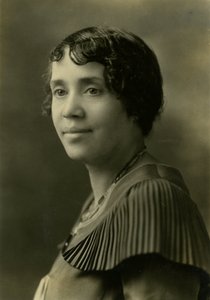
Elizabeth Beatrice Cooke Fouse was a woman from Kentucky, dedicated to gaining equality for African American women on both local and national levels. She founded as well as became the head of many organizations, with the ultimate goal of ending discrimination. Her Christian faith was critical to her activities in social and church-related clubs.
The following is a timeline of the history of Lexington, Kentucky, United States.

Julia A. J. Foote was ordained as the first woman deacon in the African Methodist Episcopal Zion Church and the second to be ordained as an elder. She was a leader in the Wesleyan-Holiness movement, preaching the doctrine of entire sanctification throughout pulpits of the African Methodist Episcopal Zion connexion.

Mary Virginia Cook Parrish taught, wrote and spoke on many issues such as women's suffrage, equal rights in the areas of employment and education, social and political reform, and the importance of religion and a Christian education. She was at the founding session of the National Association of Colored Women in 1896 at the 19th Street Baptist Church in Washington D.C. She was an early proponent of Black Baptist feminism and founder of the National Baptist Women's Convention in 1900.
Jeffery Tribble is an ordained elder in the African Methodist Episcopal Zion Church and a professor of ministry with research interests in Practical Theology, Congregational Studies and Leadership, Ethnography, Evangelism and Church Planting, Black Church Studies, and Urban Church Ministry. Academics and professionals in these fields consider him a renowned thought leader. Tribble's experience in pastoral ministry allows for his work to bridge the gap between academic research and practical church leadership.
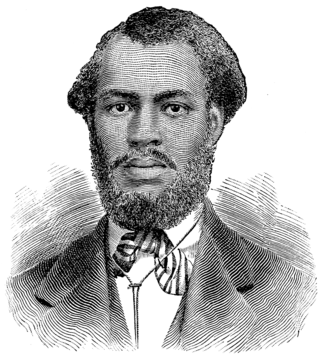
Marshall W. Taylor was a Methodist Episcopal minister and journalist in Kentucky. He is noted for his book, Collection of Revival Hymns and Plantation Melodies published in 1882. He was also the first black editor of the Southwestern Christian Advocate, a position he held from 1884 until his death in 1887.

Charles Henry Parrish was a minister and educator in Lexington and Louisville, Kentucky. He was the pastor at Calvary Baptist Church in Louisville from 1886 until his death in 1931. He was a professor and officer at Simmons College, and then served as the president of the Eckstein Institute from 1890 to 1912 and then of Simmons College from 1918 to 1931. His wife, Mary Virginia Cook Parrish and son, Charles H. Parrish Jr., were also noted educators.
Martha Jayne Keys was an American Christian minister. She was the first woman to be ordained in the African Methodist Episcopal Church and was president of the West Kentucky conference branch for five years. She was also the author of a 1933 gospel drama, The Comforter.
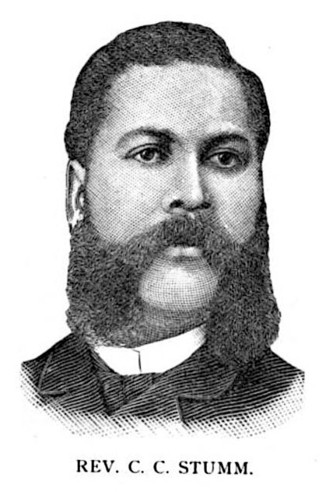
Rev. Chasteen C. Stumm (1848–1895) was an American minister, teacher, journalist, editor, and newspaper publisher. He was from Kentucky, and also lived in Tennessee, Massachusetts, Pennsylvania, and Virginia.
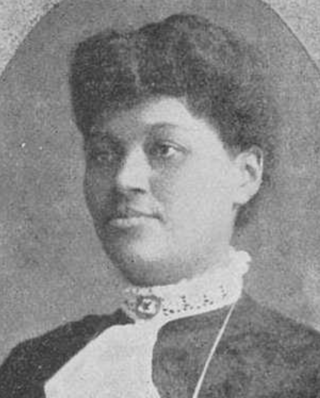
Annie Walker Blackwell was an American church worker, suffragist, and writer. The Annie Walker Blackwell School for Women and Girls in Liberia was named in her memory.
References
- ↑ "Go to Church Sunday". The Louisville Leader. Louisville Leader Collection, 1917-1950. University Archives and Records Center, University of Louisville, Louisville, Kentucky. 22 January 1949. p. 3. Retrieved 16 March 2013.
- ↑ K'Meyer, Tracy E. (2010). Civil Rights in the Gateway to the South: Louisville, Kentucky, 1945-1980. Lexington, KY: University Press of Kentucky. ISBN 978-0813139203.
- ↑ Hughlett, Daniel J. (8 October 1949). "The Training of Colored Nurses". The Louisville Leader. Digitally archived by Louisville Leader Collection, 1917-1950, University Archives and Records Center, University of Louisville. Louisville, Kentucky. p. 4. Retrieved 19 February 2013.
- ↑ Wright, George C. (1992). A History of Blacks in Kentucky, Vol. 2: In Pursuit of Equality, 1890-1980. Lexington: University Press of Kentucky. ISBN 0916968235.
- ↑ "Bishop Wallis S. S. Convention Speaker". The Louisville Leader. Digitally archived by Louisville Leader Collection, 1917-1950. University Archives and Records Center, University of Louisville, Louisville, Kentucky. 2 July 1927. p. 1. Retrieved 19 February 2013.
{{cite news}}: CS1 maint: others (link) - ↑ "About Us". Hughlett Temple A.M.E. Zion Church. Retrieved 14 February 2013.
- ↑ Wright, George C. (1985). Life Behind A Veil: Blacks In Louisville, Kentucky, 1865-1930. LSU Press. ISBN 0807130567.
- ↑ Wright, George C. (1992). A History of Blacks in Kentucky, Vol. 2: In Pursuit of Equality, 1890-1980. Lexington, KY: University Press of Kentucky. ISBN 0916968219.
- ↑ "A.M.E. Zion Religious Leaders Meet". The Louisville Leader . Digitally archived by Louisville Leader Collection, 1917-1950, University Archives and Records Center, University of Louisville. Louisville, Kentucky. 7 March 1942. p. 8. Retrieved 19 February 2013.
{{cite news}}: CS1 maint: others (link) - ↑ "To Debate Color Conduct Question". The Louisville Leader . Digitally archived by Louisville Leader Collection, 1917-1950, University Archives and Records Center, University of Louisville. Louisville, Kentucky. 22 January 1949. p. 4. Retrieved 19 February 2013.
{{cite news}}: CS1 maint: others (link) - ↑ McMillen, Sally G. (2001). To Raise Up the South: Sunday Schools in Black and White Churches, 1865-1915. LSU Press. ISBN 0807127493.
- ↑ Carney Smith, Jessie (1996). Notable Black American Women: Book 2 . Detroit, MI: Gale Research Inc. ISBN 0810391775.
- ↑ Hill, Kenneth H. (2007). Religious Education in the African American Church: A Comprehensive Introduction. St. Louis, MO: Chalice Press. ISBN 978-0827232846.
- ↑ Collier-Thomas, Bettye (2010). Jesus, Jobs, and Justice: African American Women and Religion. New York: Random House Digital, Inc. ISBN 978-0307593054.
- ↑ Walsh, Mary Paula (1999). Feminism and Christian Tradition: An Annotated Bibliography and Critical Introduction to the Literature. Westport, CN: Greenwood Publishing Group. ISBN 0313371318.